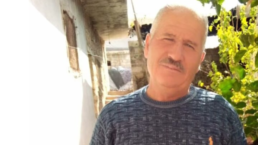Family members and people who knew Lotfi Hassan Misto described him as “a kind, hard-working man whose ‘whole life was spent poor,'” The Washington Post reported.
By Jake Johnson, Common Dreams
The Pentagon said earlier this month, without providing evidence, that a U.S. drone strike in northwest Syria killed a “senior al-Qaeda leader.”

But U.S. military officials are now beginning to walk back the claim as the victim’s family insists the father of 10 had no connections to terrorist organizations and was herding his sheep when he was slain by a Hellfire missile on the morning of May 3.
Lotfi Hassan Misto, a 56-year-old former bricklayer, has been identified by his family as the victim of the drone strike, The Washington Postreported Thursday, citing interviews with the man’s brother, son, and several people who knew him.
“They described a kind, hard-working man whose ‘whole life was spent poor,'” the Post noted.
The operation that killed Misto, the Post reported, “was overseen by U.S. Central Command, which claimed hours after the strike, without citing evidence or naming a suspect, that the Predator drone strike had targeted a ‘senior al-Qaeda leader.’ But now there is doubt inside the Pentagon about who was killed.”
One unnamed U.S. military official told the newspaper that the Pentagon is “no longer confident” that the strike killed an al-Qaeda leader. Another official said that “though we believe the strike did not kill the original target, we believe the person to be al-Qaeda.”
The entire U.S. drone program, including the process by which officials choose their assassination targets, is shrouded in secrecy, and activists argue the program should be shuttered in its entirety.
Often described by the Pentagon as “precision” attacks, U.S. drone strikes have killed thousands of civilians in recent years—deaths that U.S. officials typically refuse to even acknowledge, let alone apologize for.
The Biden administration did apologize after killing 10 members of an Afghan family—including seven children—in a 2021 drone strike in Kabul, but the U.S. has yet to uphold its pledge to compensate the survivors. A U.S. Central Command report on the strike indicated that military officials knew the attack likely killed civilians but initially lied about it in public.
The aftermath of the May 3 drone strike in northwest Syria appears to be following a similar trajectory.
On the day of the deadly strike, the watchdog Airwars published an initial assessment noting that a “60-year-old male civilian was killed by a declared U.S. drone strike on the outskirts of Qurqaniya,” immediately disputing the Pentagon narrative.
Airwars pointed to a tweet from a Syrian journalist who said that contrary to CENTCOM’s statement, the man killed was a civilian with “no connection with any organization, neither now nor previously.”
Video footage given to the Post shows “a dozen people standing nearby” as aid workers arrived at the scene of the drone strike earlier this month, the newspaper reported.
“Most stare in shock,” the Post observed. “Some cry.”
Nearly a week after the strike, a CENTCOM spokesperson said the U.S. military was “aware of the allegations of a civilian casualty” and determining whether “further investigation is necessary and how it should proceed.”
Misto’s brother told the Associated Press at the time that the U.S. military’s claims that Misto had terrorist connections were “absolute lies,” decrying his killing as “an injustice and an aggression.”
“If they claim that he’s a terrorist, or that they got someone from al-Qaeda, they’re all liars,” Misto’s brother told the Post.
Analysts told the Post that the family’s insistence that Misto had no terrorist ties appears highly credible.
“Very quickly after this strike, the White Helmets came out and identified the individual with his name and his profession,” said Charles Lister, the director of Syria and Countering Terrorism and Extremism at the Middle East Institute.
“Locals came forward to say, this guy’s always been a farmer. He’s never had any political activities; he’s never had any affiliation with armed groups,” Lister added. “The pace and breadth of such pushback was actually quite unusual.”
Citing Jerome Drevon, a senior analyst on jihad and modern conflict with the International Crisis Group, the Post noted that “typically, when al-Qaeda leaders are killed, sympathizers announce their deaths online as a celebration of martyrdom.”
“If the victim was a lower-level member of the organization, groups may not announce their death, he said, but people close to them will, often saying how they were connected to the group,” the newspaper reported. “In this case, Drevon said ‘there was nothing.'”
Recent Posts
Minneapolis: Organizing for the Protection of the Community
February 18, 2026
Take Action Now In speaking with residents in several parts of Minneapolis, beautiful stories of organizing on a block-by-block level emergedBy…
U.S. Sent a Rescue Plane For Boat Strike Survivors. It Took 45 Hours To Arrive.
February 17, 2026
Take Action Now In seas that could kill a person within an hour, it took nearly two days for a rescue plane to arrive.By Tomi McCluskey and Nick…
“Keep Hope Alive”: Remembering Rev. Jesse Jackson, Civil Rights Icon Who Twice Ran For President
February 17, 2026
Take Action Now “Our father was a servant leader — not only to our family, but to the oppressed, the voiceless, and the overlooked around the…
The Iranian Trap: Neither Military Action Nor Nuclear Negotiations Can Solve Trump’s (and Israel’s) Conundrum
February 16, 2026
Take Action Now After a failed regime-change strategy and an increasingly risky military buildup, the Trump administration turns back to nuclear…




